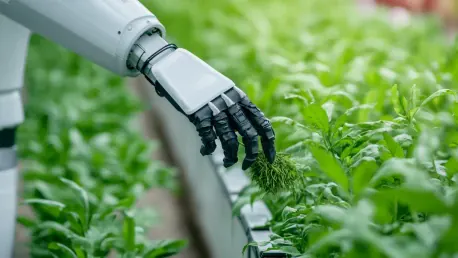The appointment of Dr. Debjani Sihi at North Carolina State University marks a pivotal moment in the integration of AI and big data into agriculture, positioning the institution at the forefront of innovative and sustainable agricultural practices. Dr. Sihi, a distinguished biogeochemist, brings with her an impressive background in environmental sciences and a passion for leveraging advanced technology to solve complex agricultural challenges. Her arrival at NC State heralds a transformative era in agricultural science, aiming to tackle issues ranging from climate change to food security through interdisciplinary approaches.
Dr. Debjani Sihi’s Journey to NC State
Dr. Sihi’s academic and professional journey is a testament to her dedication to understanding the intricate interactions within soil and their broader implications for ecosystems and agriculture. Prior to her appointment at NC State, she was a faculty member at Emory University, where she focused on soil carbon dynamics and provided mentorship to students in the environmental sciences. Her academic credentials include a Ph.D. in soil and water science from the University of Florida, where she concentrated on soil organic matter dynamics and greenhouse gas emissions in subtropical wetlands. These experiences laid a solid foundation for her expertise in biogeochemical modeling.
Dr. Sihi’s postdoctoral work further honed her skills, with significant stints at the University of Maryland Center for Environmental Science and Oak Ridge National Laboratory. Throughout her career, she has remained captivated by the complex interactions within soil that significantly impact both ecosystems and agriculture. With a belief that integrating AI into agricultural sciences offers unprecedented opportunities, Dr. Sihi’s appointment at NC State allows her to bring this innovative vision to fruition. Her interdisciplinary and technologically integrated approach signals a new wave of research aimed at achieving sustainability through data-driven methodologies.
AI and Agricultural Innovation at NC State
With Dr. Sihi’s arrival, NC State embraces a future where AI drives agricultural innovation. As the first AI-focused cluster hire in the College of Agriculture and Life Sciences, she is at the helm of combining advanced data science with practical agricultural applications. Her role signifies a major stride in situating the institution as a leader in AI-driven sustainability solutions. Dr. Sihi emphasizes that effective use of AI in agriculture requires a comprehensive and holistic approach, moving beyond isolated studies to undertake broad, integrated analyses that can forecast trends and optimize agricultural practices.
Her vision for AI in agriculture hinges on creating models that provide a detailed understanding of agriculture’s environmental footprint. By utilizing a data-driven methodology, Dr. Sihi aims to uncover the mechanisms underlying agricultural processes and develop models that elucidate their implications for food security. This comprehensive approach not only aims to enhance productivity but also ensures that environmental sustainability is maintained. Her work bridges the gap between theory and practical applications, offering valuable insights into how AI can be leveraged to meet the global agricultural demands of the future.
Core Research Focus
At NC State, Dr. Sihi’s research is geared towards examining the plant-soil-microbe-atmosphere continuum, with a focus on several key components. One of the foundational aspects of her work is the integration of advanced technologies such as sensors, imaging, and molecular tools, which are used to collect extensive data on soil and ecosystem processes. This data collection is critical as it provides a wealth of information that can be analyzed to derive actionable insights. By harnessing the power of these advanced technologies, Dr. Sihi aims to explore the underlying complexities of soil interactions and their impacts on agriculture.
In addition to data collection, Dr. Sihi employs modeling approaches that utilize machine learning and process-based models. These models are designed to predict productivity, assess greenhouse gas emissions, and analyze nutrient cycling under various environmental conditions and land management scenarios. By applying these sophisticated modeling techniques, Dr. Sihi can develop predictions that are crucial for making informed agricultural decisions. Her research focuses not only on understanding these processes but also on creating scalable solutions that address broader issues such as climate change mitigation, food security, and environmental sustainability.
Dr. Sihi places great value on linking foundational research with real-world outcomes. She posits that while agricultural land use is inherently complex, AI can help simplify this complexity by identifying patterns, predicting outcomes, and assessing the practical benefits of various agricultural practices. By connecting basic research with field studies, Dr. Sihi ensures that her findings have direct and impactful applications for farmers, policymakers, and stakeholders. Her commitment to bridging the gap between research and practical implementation underscores the importance of AI in transforming agricultural practices.
Addressing the Data Challenge
Modern agriculture is confronted with the challenge of managing vast, dispersed data. Dr. Sihi acknowledges this issue, noting that while data availability is no longer a barrier, the real hurdles lie in data sharing and tackling ethical concerns. She emphasizes the need for efficient data-sharing mechanisms to enhance our understanding of agricultural practices and to influence them positively. Public and private partnerships, particularly those facilitated by the land grant system, hold the key to advancing this understanding and bringing about significant improvements in agriculture.
Dr. Sihi underscores the significance of such collaborations in effectively addressing the data management challenge. By fostering these partnerships, stakeholders can work together to create a more efficient framework for data sharing. This framework not only makes data more accessible but also ensures that ethical considerations are addressed. By communicating the value of these partnerships to stakeholders, Dr. Sihi aims to create a robust system where data can be used to drive meaningful advancements in agricultural practices. The ultimate goal is to utilize this wealth of data to make informed decisions that enhance sustainability and productivity.
Engineering Sustainable Agricultural Decisions
Dr. Sihi is proactive in forming partnerships within her cluster area, the N.C. Plant Sciences Initiative (PSI), and other colleges to develop actionable research. Her goal is to evaluate management practices through multi-scale measurements, which can provide immediate and wide-ranging applications. She envisions a future where sophisticated algorithms guide real-time decision-making for farmers. These algorithms, designed to optimize variables like time, soil amendments, fertility, and irrigation, will play a crucial role in reducing agriculture’s environmental footprint while ensuring yield maintenance.
The potential for expanding upon the foundational work laid by her colleagues at the N.C. PSI and the Center for Environmental Farming Systems (CEFS) particularly excites Dr. Sihi. She sees significant opportunities for enhancing the understanding and mapping of plant and soil properties or ecosystem services across diverse landscapes. By integrating detailed ground-level studies with broader-scale satellite and drone data, Dr. Sihi aims to create a comprehensive understanding of agricultural ecosystems. This integrated approach not only enhances data accuracy but also provides a more holistic view of the impacts of agricultural practices.
Dr. Sihi’s commitment to engineering sustainable agricultural decisions is evident in her collaborative spirit and forward-thinking approach. By working closely with other researchers and institutions, she aims to create solutions that are both innovative and practical. Her vision of a data-driven agricultural future, guided by real-time decision-making algorithms, promises to transform traditional farming practices. This transformation is not only aimed at enhancing productivity but also at ensuring that these practices are sustainable and environmentally friendly.
Implications and Future Directions
The appointment of Dr. Debjani Sihi at North Carolina State University marks a significant advancement in the integration of artificial intelligence (AI) and big data in agriculture, positioning the university as a leader in innovative and sustainable agricultural practices. Dr. Sihi, a prominent biogeochemist, boasts an outstanding background in environmental sciences and a fervent commitment to employing cutting-edge technology to address intricate agricultural issues. Her presence at NC State signals a transformative period in agricultural science, with the goal of addressing challenges such as climate change, resource management, and food security through interdisciplinary methods. The collaboration of AI and big data under her guidance promises not only to enhance productivity but also to promote environmental sustainability. Dr. Sihi’s expertise and forward-thinking approach is expected to foster breakthroughs that will benefit the agricultural sector globally, making NC State an epicenter for groundbreaking research and solutions to pressing agricultural problems.









